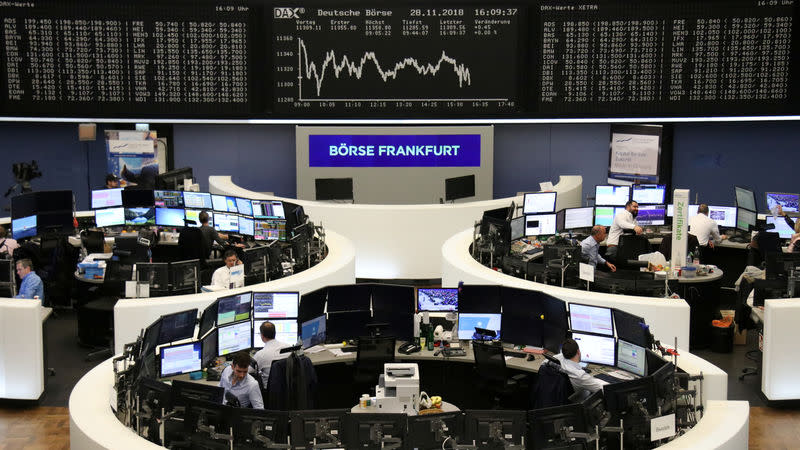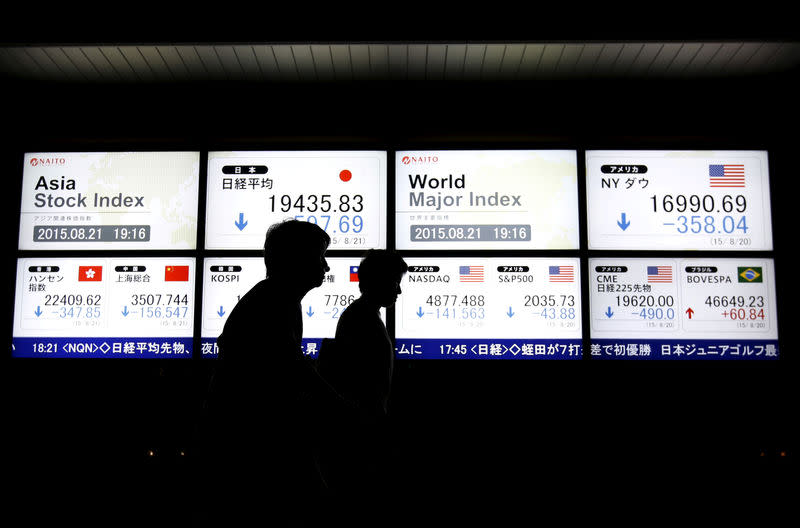Global Markets: Shares mixed, Wall Street drops on trade worries; oil surges
By Laila Kearney
NEW YORK (Reuters) - Stock markets around the world were mixed, with U.S. shares retreating on Friday amid continuing concerns over U.S.-China trade ties, while pledges by key oil producers to trim output boosted oil prices.
Oil prices surged 4 percent after big Middle East producers in OPEC agreed to reduce output to drain global fuel inventories and support the market.
Shares on Wall Street fell more than 1 percent, with a drop in technology stocks sparking a turnaround from earlier in the day amid the trade standoff.
U.S. employers hired fewer workers than expected in November, supporting a view that U.S. growth is moderating and the Federal Reserve may stop raising rates sooner than previously thought.
Nonfarm payrolls increased by 155,000 last month, but missed economists expectation of 200,000.
The Dow Jones Industrial Average fell 360.85 points, or 1.45 percent, to 24,586.82, the S&P 500 lost 38.23 points, or 1.42 percent, to 2,657.72 and the Nasdaq Composite dropped 137.53 points, or 1.91 percent, to 7,050.73.
Wall Street was also weighed down by sinking technology shares with Apple Inc down more than 2 percent.
MSCI's gauge of stocks across the globe shed 0.36 percent.
European shares staged a small recovery after three days of heavy losses, amid growing worries the U.S.-China trade row may slow world economic growth. The euro zone's STOXX index closed up 0.6 percent.
U.S. stock futures had pared losses to move higher early on Friday after the jobs report, but the advance was shortlived.
"It is still consistent with the Fed raising short term interest rates, said Scott Brown, chief economist at Raymond James in St. Petersburg, Florida. "But I think the main theme here is that investors are expecting the Fed to be even more gradual, a little bit more cautious, in raising interest rates in 2019.
Stock markets around the world tumbled on Thursday after Canadian officials announced the Dec. 1 arrested the chief financial officer of Chinese smartphone-maker Huawei for extradition to the U.S. The arrest was seen as an added threat to the world's two superpowers reaching a trade resolution.
Also contributing to this week's selloff were rising concerns about a U.S. economic slowdown signalled by a flattening Treasury yield curve.
The entire yield curve steepened on Friday, while the front half of the yield curve remained inverted after two-year and three-year yields rose above five-year yields for the first time in over a decade earlier this week. That inversion has stoked speculation as to whether a U.S. recession is looming.
The U.S. dollar weakened against major currencies after the U.S. jobs data, which backed a view that U.S. growth is moderating and the Federal Reserve may stop raising rates sooner than previously thought. The dollar index, tracking it against six major currencies, fell 0.05 percent, with the euro up 0.09 percent to $1.1384.
Oil prices jumped more than 4 percent as Saudi Arabia and other producers in OPEC, as well as allies in Russia agreed to reduce output.
Brent crude rose $2.94, or 4.4 percent, to $63.00 a barrel. U.S. crude rose 4.3 percent $53.70 a barrel, after earlier reaching a session high of $54.22.
(Additional reporting by by Ritvik Carvalho and Julia Payne in London, Medha Singh, Swati Verma in Bengaluru, Richard Leong and Saqib Iqbal Ahmed in New York; Editing by Bernadette Baum)


